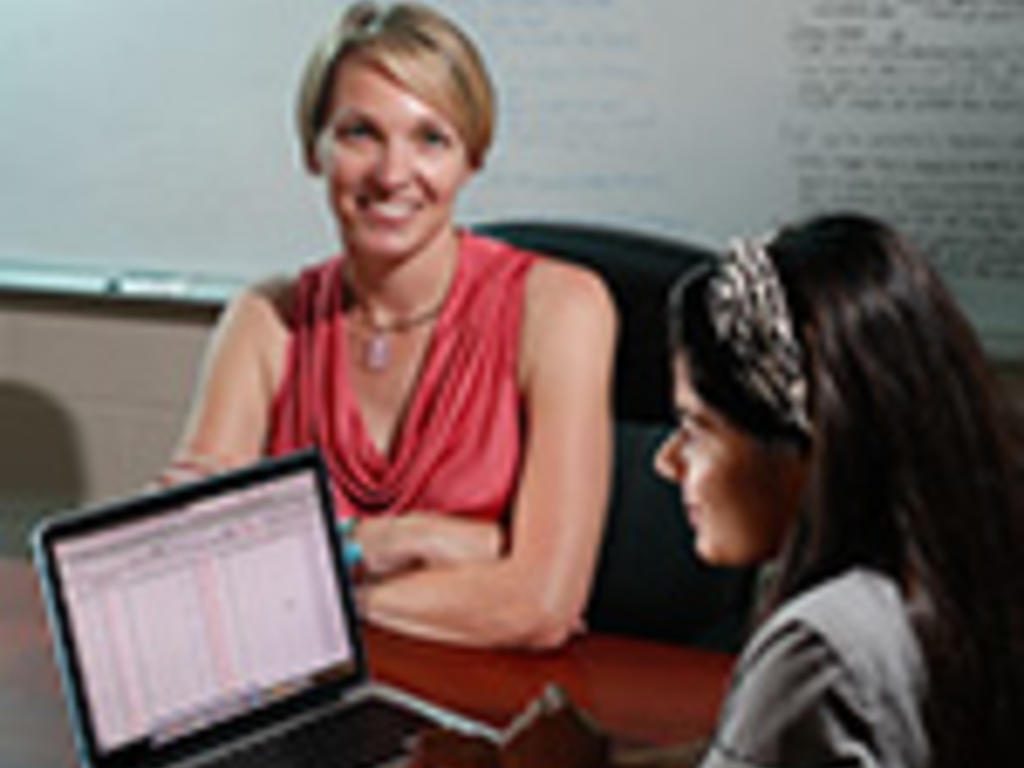By Stacey Greenberg ’94
Mentoring is something that psychology professor Dr. Katherine White ’97 takes seriously. She is a Rhodes alumna and has been working side by side with many of her former mentors since 2009, when she rejoined Rhodes as a faculty member. “I learned from the best when I was an undergraduate—model mentors such as Dr. Natalie Person and Dr. Robert Strandburg. Even though Robert has retired, I seek his advice and wisdom almost daily,” she says.
White went on to receive her PhD at the University of Florida, where she also had an exemplary mentor in Dr. Lise Abrams. “I have been very fortunate to have outstanding mentors and now I have the opportunity to pay it forward to my students,” she says.
Getting hired at Rhodes was like coming home for White, this year’s recipient of the Clarence Day Award for Outstanding Research. She was raised in Alabama, where both of her parents were university professors. “I grew up watching them work one on one with their students. They really had a love for it, and I benefitted from that,” she says.
It is this one-on-one collaboration with students that makes White excited to go to work each morning. Through her classes such as Research Methods and Statistics, Cognitive Processes, and Advanced Research Methods, White prepares her students for the rigors of research.
Students who are on her research team are actively involved in two to three studies at a time. By the time they are seniors, many students have had three years working with White. “Although the studies originate as my ideas, the students take ownership and take the lead. They experience all aspects of research—theory development, hypothesis testing, experimental design, data collection, and analysis.”
Some students have had the opportunity to present at national conferences and publish in refereed journals with White. Others have done full-time research over the summer through fellowships. White also has an active collaboration with the University of Florida, which allows her students to experience a big lab in a major research university.
White’s research in cognitive psychology seeks to understand the normal age-related changes in language, attention, and memory. She explains that one must understand typical developmental changes in cognition in order to understand changes that result from diseases such as dementia. She’s done a variety of experiments with both young and older adults, many of them alumni, to test memory, speaking, writing, and reading comprehension.
One specific study focuses on a temporary inability to recall a word or name, known as the “tip of the tongue” (TOT) state. TOTs have been documented in people as young as two years old. As people age, it becomes harder to retrieve information, specifically names. White explains that this temporary memory lapse stems from not using the sounds and words regularly enough. White is expanding her research to show how emotion hinders or enhances cognition. “Contrary to the ‘grumpy old man’ stereotype,” she explains, “older adults tend to remember positive information more than negative, which is called a positivity bias. This is one way in which emotion can be used to enhance memory.”
White’s aging research has provided invaluable learning experiences for student researchers such as Sunny Mattancheril ’14, who majored in biology and plans to attend medical school. She worked in White’s lab for the last three years and believes there are few people in this world as capable as White of delivering the perfect blend of strict professionalism and genuine personal interest in her mentees.
“Help is always provided enthusiastically and thoroughly, whether it is on how to improve research design or on personal matters, such as guidance on future studies and goals. She teaches the value of critical evaluation and to question the world around us so that we may be free, individual thinkers,” says Mattancheril.
White’s influence extends beyond graduation from Rhodes. Mary Godfrey ’12 did her honor’s research with White and will be a research assistant in an Aging Lab at Vanderbilt next year before starting her graduate degree in psychology. Godfrey says that, since first meeting White in her challenging Cognitive Processes course four years ago, White has provided her with constant and unyielding support. “Even beyond my graduation, Dr. White has remained an enthusiastic mentor and friend, as she has continued to advise me on career and graduate school opportunities. I greatly admire her dedication to her research and students, and consider myself very lucky to have her support.”
